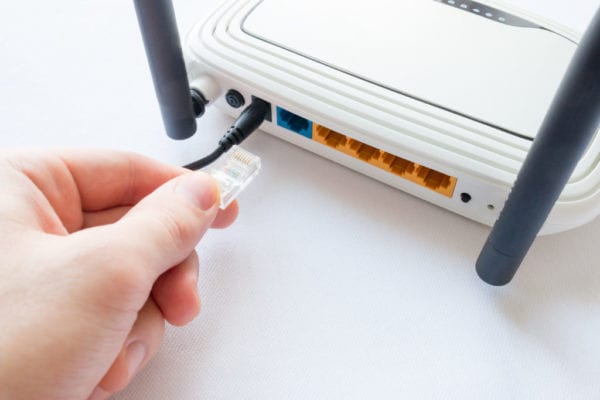What is Good Internet Speed? Everything You Need to Know

Next to the price, internet speed is one of the main decision drivers to consider when shopping for a new internet plan. However, unlike price, internet speed can be a bit trickier for some people to decipher.
You might be asking, “What is good internet speed? What is considered fast internet? And most importantly, what internet speed do I actually need?” Don’t worry. We’re here to help you break through all of the internet speed mumbo jumbo so you can make the best decision on what’s right for your home.
What is good internet speed?
A good internet speed is around 100 Mbps download speed and 20 Mbps upload. This should satisfy households that are streaming on multiple devices, online gaming, and working from home.
The average internet speed in the U.S. is currently 189 Mbps download and 23 Mbps upload. The FCC’s minimum definition of broadband is only 25 Mbps download speed and 3 Mbps upload speed, but the FCC recently proposed raising it to 100/20 Mbps.
What is fast internet speed?
Fast internet download speeds are those in the 200+ Mbps range and are often better, especially if you want your internet connection to support multiple devices and users at once without any major service interruptions. Upload speeds of 30 Mbps or higher are generally considered fast because they can easily handle the common upload activities of the average user.
What internet speed do I need?
You may still be thinking: How fast does the internet at my new place have to be? Here are some things to consider when thinking about your internet speed:
Number of internet users
How many possible users could be on the internet at one time? This is a crucial thing to think through, especially during peak usage times — like in the morning before work or when you get home. If it’s just you, no worries. But you may want to splurge for the plan with 100+ Mbps if you have a house full of people clambering to connect.
Types of internet activities
Think of your internet like a pizza. Different online activities eat up different sized slices. The more speed — or bandwidth — you have, the bigger your pizza is, and the more room you’ll have for different activities.
The FCC has some basic guidance on internet activities and the speeds they require:
- General browsing, email and social media: 1 Mbps
- Music streaming: 0.5 Mbps
- Gaming: 3-4 Mbps
- Video calls: 1 Mbps for standard definition personal video calls, and 1.5 Mbps for HD personal video calls, and 6 Mbps for HD video teleconferencing
- Video streaming: 3-4 Mbps for standard definition, 5-8 Mbps for HD, and 25 Mbps for Ultra HD
- Downloading files: 10 Mbps
So, when is splurging for the fast 200+ Mbps worth it? The higher price pays off when you have a house full of video streaming, Zoom using, video gaming, work-from-home conference callers — all at the same time.
If you live by yourself or don’t do many of the above internet activities, you can keep the good (100 Mbps or more) internet speed and redirect some money in your budget.
Figure out if your internet speed is what was promised by your providers.
Wi-Fi will slow you down
You might be looking at the speed requirements above, and thinking, “If Netflix only requires 5 Mbps to stream in HD, I could probably get by with 25 Mbps.” That’s true, but internet providers advertise the speed you’ll get using an Ethernet cable. When your connection is dispersed through Wi-Fi, you lose about 20% to 50%. That means with a 100 Mbps plan, you can expect to get 50-80 Mbps on most devices.
Upload speed vs. download speed
When you shop around for internet plans in your area, you’ll likely see two different speeds listed in the description — a “download speed” and an “upload speed.” Don’t get overwhelmed by the different numbers, but do understand the difference. Here’s what you need to know:
Download speed
Download speed is how quickly your connection can retrieve data from the internet (web pages, videos, photos, etc.). For example, if you use your computer to watch YouTube videos, it’s the speed at which your computer loads the video.
Upload speed
Key note:
Download speed is much more important for the average user since you only notice upload speed when trying to share large files. It’s normal for your upload speed to be around one-tenth of your download speed.
Going back to those government regulations, the FCC has set a minimum download speed of 25 Mbps and a minimum upload speed of 3 Mbps. The FCC says this is the minimum broadband needed for common internet usage.
What type of internet has the fastest speeds?
Cable and fiber-optic internet have the fastest speeds in comparison to other types of internet connections like DSL, satellite, and fixed wireless. Between these two types of internet service, fiber-optic internet is said to be the most consistent with its fast speeds. Cable internet can be impacted during peak times while fiber-optic internet speeds are maintained during these periods.
Internet speed ranges of common service types
| Internet Type | Speeds |
| Fiber-optic | Up to 6,000 Mbps |
| Cable | Up to 1,000 Mbps |
| DSL | Up to 100 Mbps |
| Satellite | Up to 100 Mbps |
| Fixed Wireless/5G | Up to 1,000 Mbps |
| Dial-up | Up to 56 Kbps |
*Note: These speed ranges are estimations. Can vary by provider.
The bottom line
So, what is good internet speed? Speeds of 100 Mbps or higher are generally good, but you have to keep in mind the number of devices being accessed, the number of users accessing these devices, and the types of internet activities. A faster speed can easily be considered slow if these three factors are not considered when you select your internet speed.
Frequently asked questions
How many Mbps do I need?
The Mbps you will need depends on the type of internet activities, number of devices, and number of users. For simple activities, such as checking emails and browsing social media, a minimum of 1 Mbps is recommended.
How many GB do I need for home internet?
Your home internet will require a certain amount of GBs depending on how much data you send and receive over your network. Your internet provider may be able to measure your current data usage to help to determine how much is needed.
Is 40 Mbps fast internet?
Internet speeds of 200 Mbps or higher are considered fast. A speed of 40 Mbps is OK, but it is not fast.
Is 300 Mbps good for working from home?
An internet speed of 300 Mbps is good for working from home. This is because it allows users to check emails, download large files, make and receive video calls, and browse the internet, which are all common activities for people who work from home.
Is 500 Mbps good for gaming?
Gaming generally requires between 5 and 40 Mbps, so a speed of 500 Mbps is more than good enough for gaming.
How fast is my Wi-Fi speed?
To determine your Wi-Fi speed, you can complete an internet speed test.


